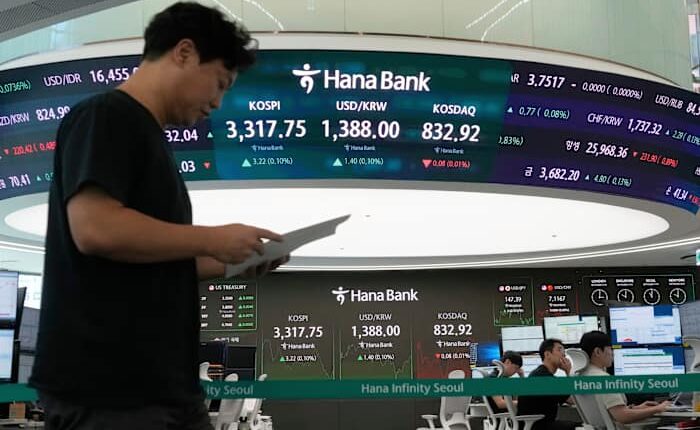Share this @internewscast.com

MANILA – Asian stocks largely rose on Thursday, bolstered by tech stock gains. This followed Wall Street’s achievement of new highs, propelled by an unexpectedly positive inflation report and a remarkable growth prediction from Oracle, driven by the artificial intelligence surge.
In Tokyo, the Nikkei 225 climbed 0.8% to reach 44,171.03, with tech investor SoftBank Group’s stock surging nearly 10% for the second consecutive day.
Thursday’s data showed Japan’s producer prices increased by 2.7% in August compared to a year earlier, up from 2.5% in the preceding month, aligning with market forecasts. The price hike was attributed to increased costs of food, transport equipment, and machinery.
In Chinese markets, Hong Kong’s Hang Seng index slid 0.3% to 26,124.85 while the Shanghai Composite index rose 1.1% to 3,855.10.
Semiconductor Manufacturing International Corp’s shares surged nearly 6%, Hua Hong Semiconductor saw a nearly 5% rise, and Cambricon Technologies, often dubbed China’s Nvidia, shot up over 10%.
South Korea’s Kospi edged up 0.4% to 3,326.15, while Australia’s S&P/ASX 200 fell by 0.4% to 8,794.30. India’s BSE Sensex gained slightly, less than 0.1%, and Taiwan’s Taiex increased by 0.4%, trimming earlier advances.
“Asia’s Thursday market performance appeared dynamic from afar but lacked momentum up close. Following Wall Street’s record-breaking streak, traders in Tokyo and Seoul attempted to maintain the momentum. However, Hong Kong and Sydney faltered, causing the MSCI Asia-Pacific index to stall after five straight days of gains,” remarked Stephen Innes of SPI Asset Management in a commentary.
On Wall Street, the S&P 500 rose 0.3% on Wednesday and set an all-time high for a second straight day. The Dow Jones Industrial Average dropped 220 points, or 0.5%, and the Nasdaq composite edged up by less than 0.1% after both set records the day before.
Stocks have hit records in large part because Wall Street is expecting the economy to pull off a delicate balancing act: slowing enough to convince the Federal Reserve to cut interest rates, but not so much that it causes a recession, all while inflation remains under control.
Many things must go right for that to happen, and an encouraging signal came from a report Wednesday saying inflation at the U.S. wholesale level unexpectedly slowed in August.
A potentially more important report is coming Thursday, which will show how bad inflation has been for U.S. households.
Traders were already convinced the Fed will deliver its first cut to interest rates of the year at its next meeting, but they need inflation data until then to be mild enough not to derail those expectations.
On Wall Street, tech stocks led the way after Oracle said AI-related demand is set to send its revenue surging. Oracle stock leaped 35.9% for its best day since 1992, even though it also reported results for the latest quarter that came up just shy of analysts’ expectations.
Taiwan Semiconductor Manufacturing Co., which makes chips used in AI and other computing, saw its stock that trades in the U.S. climb 3.8% after it said its revenue jumped nearly 34% in August from a year earlier.
On the losing side of Wall Street was Apple, whose drop of 3.2% helped drag the Dow lower and was the heaviest single weight on the S&P 500. Some analysts said its unveiling of new iPhones the day before contained no surprises and may not drive much growth in demand.
In other dealings Thursday, benchmark U.S. crude shed 22 cents to $63.53 per barrel. Brent crude, the international standard, lost 14 cents to $67.35 per barrel.
The U.S. dollar rose to 147.43 year from 147.36 yen. The euro was nearly flat at $1.1698 from $1.1704.
___
AP Business Writers Stan Choe in New York contributed to this report.
Copyright 2025 The Associated Press. All rights reserved. This material may not be published, broadcast, rewritten or redistributed without permission.











